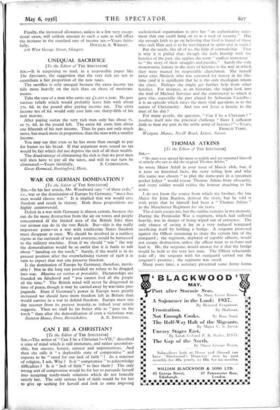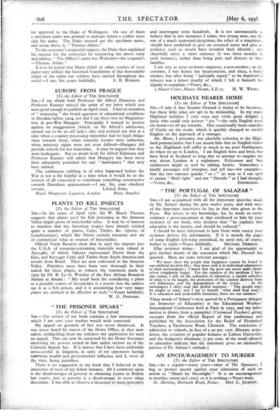THOMAS ATKINS
[To the Editor of THE SPECTATOR]
SIR,— " No man ever spread his name so widely and yet remained himself so utterly obscure as did the original Thomas Atkins."
So wrote Major Athill in your issue of March t8th, but, if it rests on historical facts, the story telling how and why this name was chosen "to play the name-part in a specimen pocket ledger" would rescue Thomas Atkins from obscurity, and every soldier would realise the honour attaching to his name.
I do not know the source from which my brother, the late Major Sir John Burdon, derived the story, but he told it with pride that he himself had been a "Thomas Atkins" in the Manchester Regiment for six years.
The details escape me, but the outline remains in my memory. During the Peninsular War a regiment, which had suffered heavily, was in danger of being wiped out of existence. The only chance of saving it lay in a very reduced rearguard sacrificing itself by holding a bridge. A sergeant protested against the Officer remaining to share the certain fate of the rearguard ; the regiment, depleted of capable officers, would not escape destruction, unless the officer went to re-form and lead it. He, the sergeant, would answer for it that the bridge would be held to the very last man. The Officer reluctantly rode off ; the sergeant with his rearguard carried out the sergeant's promise ; the regiment was saved.
Many years later, a secretary presented some Army forms for approval to the Duke of Wellington. On one of them a specimen name was printed to indicate where a soldier must sign his name. The Duke crossed out the speamen name, and wrote above it, "Thomas Atkins." ' To the secretary's respectful request, the Duke then explained his reasons for the correction by recounting the above story and adding, " The Officer's name was Wellesley—the sergeant's —Thomas Atkins."
It is to be hoped that Major Athill or other readers of your paper may adduce the historical foundations of this honourable origin of the name our soldiers have carried throughout the world.—! am, Sir, yours faithfully, E: R. 13uttooti.



































































 Previous page
Previous page